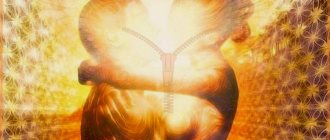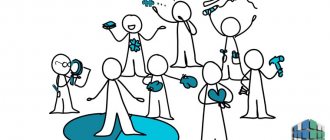Traps of love: a metropolitan psychologist told how emotional dependence is formed
What is love? The most beautiful of feelings that we all wait for. But what to do if it develops into a depressing emotional dependence? Natalya Klyuchnikova, a psychologist at the Moscow Psychological Assistance Service, spoke about this in more detail.
Love does not equal suffering
If you analyze works of art about love, you will be surprised to discover that relationships are impossible without pain, suffering and jealousy. Well, really: the images of Anna Karenina and Alexei Vronsky are much more memorable than the images of Kitty Shcherbatskaya and Konstantin Levin. But if you ask a person whether he would like to constantly suffer because of love, the answer is unlikely to be positive. So what's the deal? After all, we all want to love and be happy in relationships, but we are attracted to drama.
“Yes, indeed, drama is welcome in works of art. This captivates the reader or viewer. Allows emotions to manifest themselves more clearly and prominently. But in reality, people are not ready to live, constantly swinging on emotional swings,” notes the psychologist.
Beliefs that lead to emotional dependence, depriving the possibility of healthy relationships:
- Happiness is only possible in the presence of another loving person. Exactly, the presence of another and loving person should make me happy. What if you think about it? After all, we don’t think that transplanting an organ from a donor will make us completely healthy. In the end, the donor, having given us something from his body, will become sick himself. Why in love do we so want to be happy at the expense of another person?
- Love is impossible without complete dissolution in each other . If I dissolve in another person, what will happen to my feelings, my way of life? Will I then disappear completely? In my opinion... it's very scary. Sugar or salt dissolved in water cease to be independent substances, turning into a flavoring additive. True, it is possible to return them back by evaporating the water.
It all starts in childhood
Like many of our problems, emotional dependence comes from childhood. And even more precisely - from the first months of life. Our mothers, speaking to us in children's lisping language, lay the foundations of attachment.
If the child’s needs are met, we feel safe, a secure attachment is formed, which develops further when the child sees over and over again that he is accepted and heard.
What if it's different? The baby is pampered, but is not heard, his needs are not met, replaced with the common phrase: “I am your parent, I know better what you need.” If they try to solve his problems for a little man, without letting him make his mistakes? If they don’t protect you when only a close and significant adult can protect you? What will happen to such a child when he grows up? Well, of course, he will look for a loved one who will protect him, satisfy all his needs, will always be there and love him.
In this case, I am ready to dissolve in my partner, just to get it all. And at the first stage everything really happens well. We are warm and cozy. Our expectations were met. Or almost justified. But at some point we discover that we are not there, that our partner (friend) does not care about us as much as we would like. And this is inevitable. After all, another person is significantly different from us. He has his own psychological boundaries that protect his inner world, emotions, feelings, thoughts, time. When he takes care of us, he takes care of us based on his own ideas.
Getting rid of addiction
The most difficult thing when getting out of emotional dependence is admitting it to yourself. But as long as you play hide and seek with yourself and think that the other person needs to improve in order for everything to work out, nothing will change at all. You will continue to live with pain, with mental wounds, waiting for changes.
Having taken the most difficult step of taking responsibility for your addiction, it is very important to see your needs and begin to listen to them. A loved one can help you with this, but still, only you are the main one in your life.
It’s a good idea to seek help from a support group or specialist if you realize you can’t cope on your own. Specialists from the Moscow Service for Psychological Assistance to the Population work in the capital and conduct free classes on this topic. You can also sign up for free in-person and remote consultations. 24-hour telephone number for emergency psychological help in Moscow - 051 from a landline phone, +7 (495) 051 from a mobile phone. The psychological support chat is also available 24/7 on the website: www.msph.ru.
Press service of the Department of Labor and Social Protection of the Population of Moscow
Main reasons for the phenomenon
The causes of emotional dependence go deep into childhood. It is then that security and a sense of self-confidence are formed in relationships with parents. But there are situations when a child does not receive enough love, which leads to problems in adulthood. Most often this happens in the following cases:
- Parents are afraid or simply do not know how to show their emotions. They dress, teach, feed, buy toys, but do not talk about their feelings, do not praise for achievements. Often such parents forbid the child to show his emotions and talk about his desires.
- Children lose their parents early. One of the parents or both died at once; it is possible that they were deprived of the right to raise the child. It doesn’t matter - the child was left without main support. Other people, no matter how close they may be, will not be able to fill this void; the feeling of abandonment remains forever. It is especially difficult for children who end up in a shelter.
- Parents are immersed in work or leaving to earn money. The child feels abandoned, despite the fact that he is left with his beloved grandmother. He does not receive enough of the emotions that only mom and dad can give. Divorce also affects children, especially if one parent completely disappears from their lives.
- Relatives ignore the child's needs. The main needs of children are safety and love. They see them in the actions of their parents: when they feel sorry, support, admire victories, buy toys, read fairy tales. When a child hears: “don’t cry, you’re not little,” “wait, I don’t have time,” “it’s my own fault,” “why do you need this toy, it’s a waste of money,” he feels unnecessary and withdraws into himself.
- Parents raise a “comfortable” child. He grows up with the understanding that he must earn love: if he doesn’t do something, it means he won’t be loved. If a girl grew up in such conditions, in the future she will become a “comfortable” wife who will revolve around her husband and fulfill all his desires. She will not have her own personal life, and over time she will get bored with her husband, and he will leave her for a self-sufficient mistress.
These are the main reasons for the emergence of emotional hunger, and addicts begin to look for opportunities to “patch up” these gaps in love relationships. But no partner can give them this. From an independent person they can only receive the adult love of a man or woman.
To fill yourself with missing feelings, you will have to work on yourself. Psychologists help with this - not just to understand the reasons, but also to correctly apply the techniques created in order to get out of this vicious circle.
Chemical revolution
For many years, it was believed that the brain sends electrical impulses along its complex network of circuits (which, if extended in a single line, would cover thousands of kilometers) to regulate various functions that allow us to act in the world around us. Now we are discovering that in addition to this electrical model based on neurons, axons, dendrites and neurotransmitters, the brain functions at another level.
Candace Perth speaks of this chemical brain as a second nervous system and points out our collective reluctance to accept such a model: “What has been especially difficult to accept is that this chemically based system is undoubtedly more ancient and basic to the body. Peptides such as endorphins are created inside cells long before the appearance of dendrites, axons, and even neurons—in fact, even before the appearance of the brain itself.” This may be a shocking revelation for you or prompt you to re-evaluate your existing knowledge. […]
First of all, it is important to understand that we are chemically conditioned beings. We are products of our biochemical activities, from the cellular level, where millions of millions of chemical reactions and processes occur while we breathe, digest food, fight germs, move, think and feel, to our moods, actions, beliefs, sensory perceptions, emotions, right down to experience and training. While behaviorists and other psychologists once debated whether heredity or the environment were primarily responsible for our behavior, new scientific research and discoveries have shifted the focus toward the chemical basis of emotions.
The battle of Maslenitsa and Lent (fragment). Pieter Bruegel. 1559
Characteristic manifestations
Emotionally dependent relationships have their own symptoms, which can help you understand that changes in life are long overdue:
- Fear of losing a partner, inability to cope without him, willingness to give everything just so that the person remains close.
- Giving up your personal life, when the priority is the affairs and desires of your loved one. At the same time, you completely abandon your personal hobbies, you don’t have time to communicate with friends, you feel uncomfortable being alone with yourself.
- Emotional swing: a good mood and a sense of security are abruptly replaced by jealousy, a feeling of loneliness, and the fear of loss increases.
- You live only to please your partner, forgetting about your interests and not demanding anything in return.
- Constant conflicts.
Emotions and heredity
Previously, scientists believed that we express four basic primitive emotions, determined in each person by the structure of a special part of the midbrain called the amygdala. In initial testing, the researchers electrically stimulated the amygdala and observed the sensations or actions of various living organisms. In a more primitive sense it is aggression; subordination; fear or surprise; and acceptance, connection, or happiness. Nowadays, thanks to the progress of neurobiology, this model has evolved to include three more states in addition to the four named: surprise, disdain and disgust. It is not difficult to understand that surprise is associated with fear and that disdain or disgust can easily be associated with anger or aggression.
Many sources suggest that the subjective experiences unique to each individual include some combination or mixture of each of these primary emotions. Secondary emotions, or social ones, are created from primary ones, like mixing primary colors to obtain shades. These secondary emotions include embarrassment, jealousy, guilt, envy, pride, trust, shame, and many others.
It seems to me that feelings are created something like this: the neocortex reacts, feels or thinks, after which the midbrain produces neurochemical factors that then support or activate various regions and neural networks to produce both our unique and common sensations.
Sensations, you will remember, are the result of comparative experiences that we all have, thanks to our common environment and social conditions (our formation through learning and personal experience; that is, upbringing); short-term genetic properties inherited from parents (their ingrained emotional experiences; i.e. nature) and general long-term genetic properties (the human brain is structured in a similar way; therefore we share common universal tendencies; nature again).
Thus, this "software and hardware" of our body determines the perception of the environment and the behavior of all members of our species using relatively the same emotions. In this case, I do not intend to go into the subtleties between emotions, sensations, urges and sensory reactions; let's just agree that they are chemically activated states of mind and that emotions are nothing more than the end products of our personal experiences, both common and unique.
The battle of Maslenitsa and Lent (fragment). Pieter Bruegel. 1559
Medications
Since emotional dependence is not chemical, it is usually treated with sedative antidepressants, which are also prescribed for other problems with the psyche and nervous system.
- "Maprotiline" - reduces apathy, helps get rid of depression and psychomotor retardation.
- Prozac is a well-known drug that is used for depression, neurotic disorders and during the treatment of addictions. It makes it easier to bear the absence of the object of dependence and reduces anxiety.
- Deprim can be used without a doctor's prescription. It increases performance, eliminates depression and emotional exhaustion, while acting quite gently. Therefore, it is often taken by people suffering from emotional dependence.
- Ginseng tincture has long been known as a remedy that increases emotional mood and performance. It can be used as a drug to activate vital energy.
- “Persen” is quite often prescribed for poor sleep, irritability and lack of concentration.
- Mirtazapine restores the ability to enjoy, improves sleep and helps normalize appetite.
Chemicals and cortisol
The most basic, basic information that we need to learn is this: every time a thought is ignited in the brain, chemicals are produced that cause corresponding sensations in us and various reactions in the body. Over time, the body becomes accustomed to the level of chemicals that circulate in the bloodstream and are carried to each of our cells. Any interference with the steady, steady state of our body chemistry results in discomfort.
We will do almost everything in our power, consciously and subconsciously,
relying on your own feelings to restore the usual chemical balance.
Like the fight-or-flight response, whenever a thought is ignited, various chemicals are released. The three mediators of chemical communication in the body are neurotransmitters, peptides, and hormones.
Therefore, whenever we have a thought, neurotransmitters go to work in the synaptic space, lighting up the neural networks associated with a specific concept or memory.
Any memory has a corresponding chemical component that is reproduced by peptides. Part of the midbrain, the hypothalamus, produces many different peptides. The hypothalamus can be likened to a laboratory in which a corresponding chemical signature is developed for every thought ignited in our brain and every emotion experienced. This is why the limbic, or midbrain, is often called the emotional brain. It awakens our sexual currents, activates creative thinking and evokes a motivating competitive spirit in us. This emotional brain is responsible for producing chemicals that trigger our emotional reactions and thoughts.
When a "chemical thought" enters the bloodstream, it excites the body, much like ACTH ( adrenocorticotropic hormone)
— approx. T&P) with glucocorticoids (cortisol). When the body is aroused, it communicates through a negative feedback loop to maintain acceptable levels of chemicals in the brain and body cells.
Let's look at how this negative feedback loop works. Because the hypothalamus is the most vascular part of the brain (with the largest blood supply), it monitors the circulating volumes of each peptide during every chemical reaction in the body. For clarity, let's say that with a high level of ACTH, the level of cortisol decreases, and then the hypothalamus reduces the production
ACTH. The level of chemicals is determined by the individual internal indicators of each person. Each person has his own unique homeostatic balance, which is directly influenced by his genetic program, his reaction to external circumstances and his own non-verbal thoughts.
Negative feedback loop between brain and body
The illustration shows how the brain and body work together to regulate chemical communication. High levels of peptides circulating in the body affect various glands and organs that produce hormones and secretions. When the brain detects high levels of hormones or secretions and low levels of circulating peptides, it acts as a thermostat and stops producing hormones. When the level of hormones circulating in the body decreases, the brain senses this decrease through the hypothalamus and begins to produce more peptides, from which more hormones can be produced.
The battle of Maslenitsa and Lent (fragment). Pieter Bruegel. 1559
Step-by-step instructions for overcoming addiction
- Step 1 – AWARENESS.
Start by recognizing and accepting the fact that addiction exists. Mentally talk to yourself, say that you would like to get rid of this condition. This step is very important, the brain is accustomed to thinking that this is love, not addiction, your sincere readiness for change will force the subconscious to look for options to change the situation. - Step 2 – SOLUTION.
The next step should be a firm decision to leave the painful relationship or a decision to change your personality (thoughts and behavior) within the existing relationship. It is necessary to understand that dependent relationships are supported by both participants in the union, so if you get rid of addiction, your partner will either have to change in order to follow you into a new healthy relationship, or leave himself. - Step 3 – DEFINING BOUNDARIES.
Learn to refuse your partner and defend your position. At this stage, self-love gradually returns, you will begin to do what you like, listen to your desires. - Step 4 – FILLING THE VOID .
In a dependent relationship, your own hobbies have long faded into the background. Start getting to know yourself again. You can make a list, indicate in it what your partner gives you that you cannot give yourself, and start bringing joy to yourself. You can also listen to yourself, remember what you loved to do, what was interesting to you, resume lost friendships or family relationships, return to an old hobby or find a new one. Sports or dancing can be an effective medicine, because by improving one’s body, a person not only increases self-esteem, but also gains health and a good mood. - Step 5 – STUDY YOUR PROBLEM FROM THE INSIDE.
Addiction is a complex psychological condition, and not everyone can cope with it on their own or see their problem from the outside. In our “Psychology of Addiction” course, experienced teachers will tell you how to cope with emotional dependence, teach methods of mental correction and help you acquire a new profession as a psychologist to help not only yourself, but also other people in a similar situation. - Step 7 – NEW RELATIONSHIP.
Start building new relationships or analyze your feelings in existing relationships - how strong is your addiction still, is there any change for the better. To do this, on a scale from 1 to 100, determine how happy you are.
Signs
Emotional dependence on a person is quite difficult to recognize in the initial stages. And when a person can no longer imagine himself without another, it seems to him that everything is in order. In this way, psychological defenses are activated that protect the nervous system from unnecessary stress. Therefore, it is doubly important to know the signs of the disease, which will help identify the addiction to the person himself.
- You constantly lack attention and communication with a specific person. Even if you spend a lot of time together, when you break up you feel sad and think about him all the time.
- You begin to attribute your feelings and desires to someone else. In conversation this is usually expressed as “we want”, “we will go”, etc. This is a clear sign of merging with another person.
- All your interests begin to revolve around your loved one or partner. Even in meetings with other people, you constantly discuss his actions, character, words, etc.
- Possessive feelings and unreasonable jealousy are a sure sign of emotional dependence on another. After all, others seem to be trying to take away your time that you could spend together. This is why wives often forbid their husbands from seeing their friends and gradually limit their social circle.
- Idealization of a partner and refusal to notice obvious shortcomings (for example, alcoholism or squandering).
- Complete dependence on the opinion of another person. Many emotionally dependent people can radically change their image to suit the standards of another person. In dependent relationships between children and parents, this usually appears as a need to follow all advice and instructions, trying to present oneself in the best possible light, to the detriment of one's own needs.
- Planning of long-term and short-term goals is not carried out without the participation of the latter. At the same time, any change or refusal to carry out the plan is perceived as an attempt to break the existing emotional connection.
- Your relationship becomes a burden, but you can’t imagine yourself without it. Due to the pathological nature of dependent relationships, people simply cannot feel happy in them. Usually short periods of joy are followed by long quarrels and squabbles, during which the dependent person feels fear and helplessness.
- In the extreme stages of addiction, nothing can bring a person happiness or joy. Only communication with a loved one can dispel the clouds over your head. This is a sure sign that drastic measures need to be taken.
Sexual addiction
A special case of emotional addiction is sexual addiction. She is characterized by an obsessive desire for sexual intercourse. If love addiction is characterized by a painful connection with one partner, then for sexual addiction it is not the object that comes first, but the action itself. Sexual addiction is more common in men. As in the cases of other addictions, for a sexaholic the object of his sexual addiction is a way to escape from reality, from himself and his own feelings. People with this type of addiction are characterized by numerous emotional difficulties: a tendency to low mood, impulsiveness, low self-esteem, feelings of guilt and shame, inner emptiness, the habit of hiding their problems from loved ones, inability to get pleasure from other sources, combination with other addictions, problems with health.










